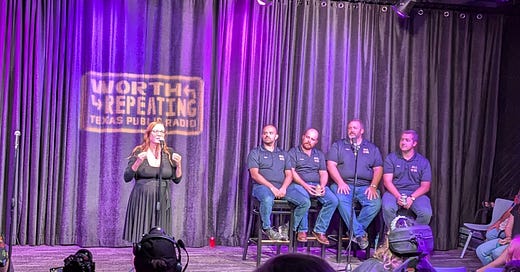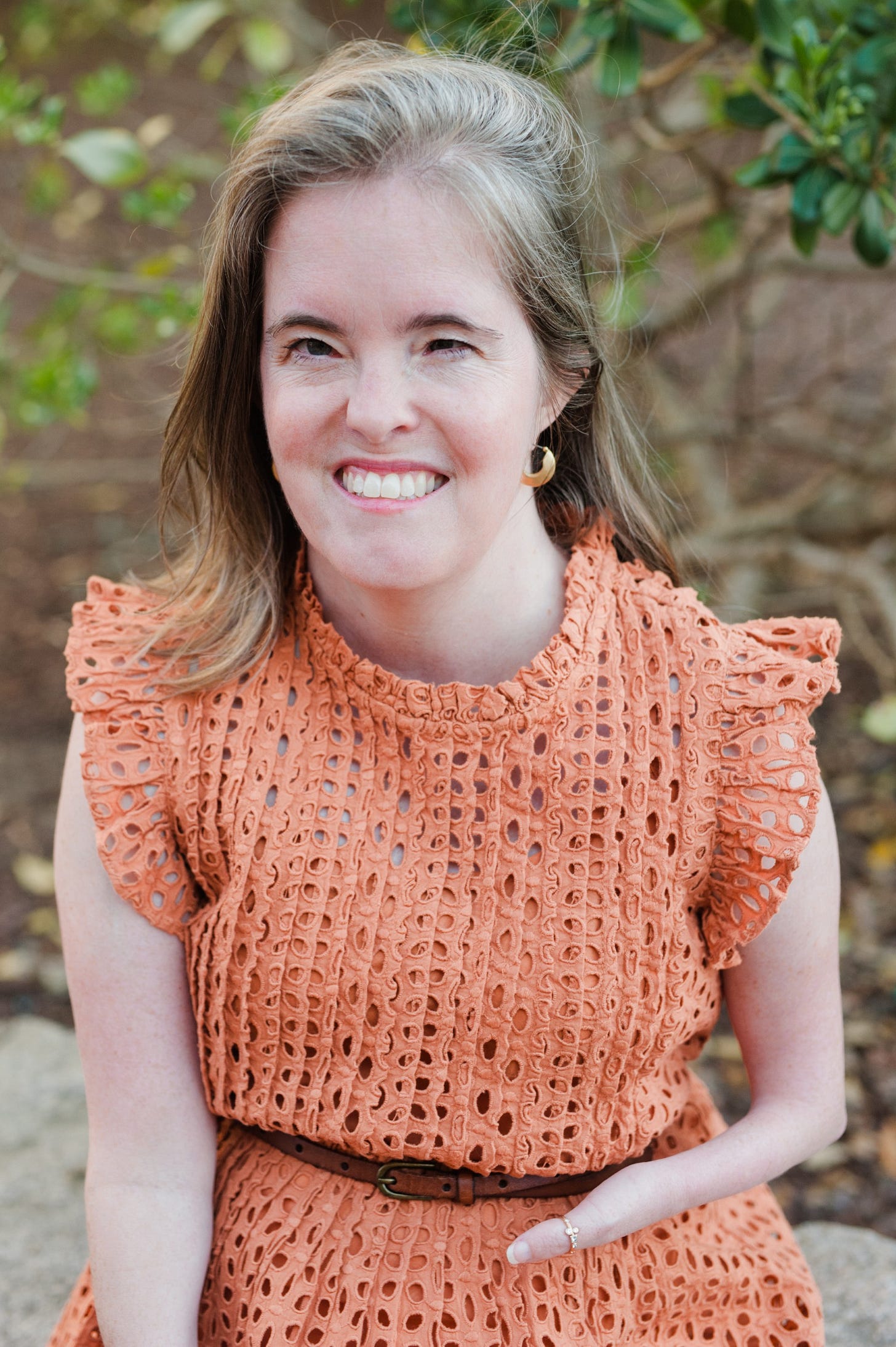I recently had the chance to share a true story in front of a live studio audience as part of a public radio show called Worth Repeating. (My story begins around 16:30). I had already told this story on the page, both in a sneaky fictional form as my debut novel, and as an essay that’s included in my memoir-in-progress, so I figured it wouldn’t be that hard to adapt it for the stage. But I quickly discovered that telling a true story live is a much more nerve-wracking and emotional experience than writing that same story at my desk. For one thing, there’s no time to edit or pause to reflect. You just have to step toward the mike, board the story like a train, and then try to connect with the people in the seats nearby as you all go speeding through the dark theatre towards your destination.
David Sedaris famously uses live performance to finesse and edit his popular essay collections. And I can now see just how helpful this might be. The feedback from a live audience lets you know in real-time when your story is connecting (and when it’s not). There are laughs or groans of commiseration, coughs (which can signal boredom or discomfort), and silences (which can mean either enthrallment or speechlessness at just how bad you’re bombing). I was familiar with these sounds from my days as an actor and an amateur comedian, but I had never tried telling a fully true story live, especially a story that wasn’t funny. In fact, the story I felt compelled to share that night was the opposite of funny.
Sometimes the big stories that shape us need to be told more than once, and approached from a number of different directions. This was one of those stories, and although I was sick of it, I also felt the need to tell it one more time. Hopefully this would be the last time. Maybe I’d learn something new about why this happened.
As I began to speak, I felt the generous weight of attention in the room. I noticed how my voice was shaking as I let myself sink into the hard places, and how the occasional laugh from the audience acted as a moment of release that renewed our engagement with the story. I noticed how time was speeding up and slowing down, and how urgent it felt to find the right ending, even when the onstage barbershop quartet gave me a warning doo-wop that my time was almost up. (By the way, my inner critic will forevermore sound-off in four-part harmony.)
At intermission, while my husband waited in line to buy me a much-needed beer, I stood in a corner of the lobby thinking about the ways this live experience compared to writing an essay. Both required me to adjust pacing, search for humour and meaning, and be vulnerable. But telling a story live, these impulses were more immediate and obvious, like neon signs or giant billboards along my story’s train tracks.
A man walked over to where I was standing and introduced himself as a retired cop. He told me a story of his own, which made me smile. I like to imagine my essays having this same result—connecting with a reader who’s had a similar experience—but I don’t often have the chance to look into that reader’s eyes and see my story reflected there. The conversation with this audience member was a vivid reminder of why sharing true stories feels so important to me. Because, at their best, stories can create meaningful connections. They can assure us that we’re all passengers on the same train. That no one is travelling alone.
Some upcoming opportunities
The Malahat Review's Open Season contest is on now. Submit CNF of up to 2500 words by Nov 1. More details here.
Prairie Fire Magazine's CNF contest is being judged this year by Jenny Heijun Wills. The deadline is Nov 30 for CNF of up to 5,000 words. More details here.
Diaspora Dialogues, an organization that supports diversity in Canadian literature, is currently offering free mentorships to emerging writers who are working on book-length manuscripts. More info available here. (Deadline Nov 29).
Me, myself, and friends
Writing can feel like a solitary activity, so it’s important to remember: you’re not doing this work alone. Many others are at their desks right now, including this month’s highlighted writer, Allison Kirkland. Get to know Allison and her work via the answers she shared with me here:
Allison, what’s important to you about writing true stories?
I was born with a physical disability: a limb difference and shortness of stature. Because of my visible difference many people in my community – with the best of intentions – tried to make sense of me in the best way they knew how: by telling stories that weren’t necessarily the ones I would have told about myself. For example, the medical community attached certain terms to my body that I didn’t get to choose: growth retardation, birth defect. I was encouraged both implicitly and explicitly to think of my body in a certain way: as deficient, as lacking, as less than, as other.
So, it’s important to me to write true stories because I’m unearthing the stories that feel closest to my own experience out from underneath the narratives others gave me that weren’t ever mine. I think that’s something that everyone – not just physically disabled people – can relate to.
I also like to write true stories because they help me, well, get to the truth, which is often much more nuanced, complex and expansive than it looks at first glance. During the process of writing my memoir, I’ve tackled big, emotionally charged moments from my past that I thought I knew quite well, and often I’ve been surprised by what I find there, when I really commit to putting these moments on the page. Sometimes I’ve remembered a story one way for years, but when I take the time to write it out I find a much more compassionate story lurking underneath. That process of discovery never fails to surprise me and gives me more compassion for my own humanity and the humanity of the people in my life.
What’s important to you about reading true stories? Who are you reading right now?
When I’m reading a true story, I’m reading a survival guide. Being a human being is hard. Every day we are living with questions of survival from the existential to the very small.
How will I survive middle school? How will I survive being in a body that looks different than everyone in my family? How will I survive being single for decades, maybe forever? How will I survive the fear and uncertainty that floods me if I try to find someone to love? How will I survive this physics exam? How will I survive the boredom of waiting in this grocery store line? How will I survive being honest about my life with friends and family who don’t look like me and may not understand?
As someone who didn’t grow up with any writing role models – or anyone, really – that looked like me in 1980’s North Carolina, I suspect maybe I had more questions than most about my own survival. But we are all navigating these little moments, day by day.
As Nietzsche says, “No one can build you the bridge on which you, and only you, must cross the river of life.” But memoirs can supply you with the bricks you need to build that bridge. They can make that passage a little easier, and show us how to live, how to locate our values and desires.
I recently finished Heavy: An American Memoir, by Kiese Laymon. It’s a gorgeously rendered, searing portrait of what it means to exist in a Black body in America, and both a love letter and a plea to his mother, the woman who raised him. It gave me more insight into the Black experience and the ways in which our bodies carry the trauma of being alive.
Anything you'd like to tell us about the piece you're going to share?
I’m a longtime reader of Brevity Blog and had bookmarked many of their craft essays for myself and my students, so it was a real thrill to be included in this vast compendium of writing about creative nonfiction. I’m still pinching myself!
The tweet that I mention in this piece was written by Lisa Thornton. I’ve since sent her this essay to let her know the impact that her tweet had on me, and she was so pleased that her tweet sparked this essay. To me that’s what it’s all about: connecting with a community of other writers and learning from each other.
You can read Allison’s essay on the Brevity blog here.
Allison Kirkland is a writer and creative writing instructor based in Durham, NC. She earned her MFA in creative nonfiction from The New School and has been teaching creative writing for almost a decade. Her words have appeared in Brevity, Under the Gum Tree and Nieman Storyboard, among others, and her work has received support from the Norman Mailer Center and the Durham Arts Council. In 2022 she was named an Ella Fountain Pratt Emerging Artist by the Durham Arts Council. She is currently working on a memoir.
Interested in being featured in a future issue? Contact me with links to online creative nonfiction work to be considered.
Know someone who might enjoy this content? Feel free to share it!






It's such an honor to be featured in Truly Important, Becky! Thanks for the opportunity.
I loved reading what you had to say about telling your true story out loud. Can't wait to listen to it!
Love love love!